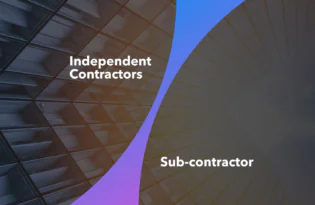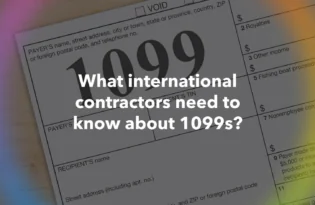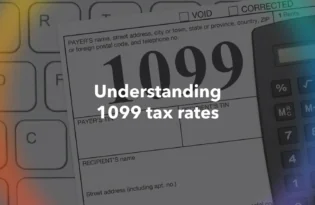What is the W-8BEN-E Form
What is the W-8BEN-E form and do you need it? We’ve got all the answers you’re looking for to expand your international workforce

The W-8BEN-E form, also referred to as “Certificate of Status of Beneficial Owner for United States Tax Withholding and Reporting (Entities), refers to the IRS form used by foreign entities receiving income from the US. It serves two specific purposes:
- Establish foreign status
- Claim any applicable tax treaty benefits
Not everyone needs to file this particular form, but those who do need to understand how it works, how to file it, and specific pitfalls to watch out for when filing.
The following article discusses all three, in addition to advice for business owners looking for simpler workarounds.
Who needs the W-8BEN-E Form?
There are several instances in which a W-8BEN-E form applies:
| # | Category |
|---|---|
| 1 | Foreign entities receiving US-source payments are subject to Chapter 3 withholding |
| 2 | Foreign partners in a partnership subject to Section 1446 |
| 3 | Foreign entities maintaining an account with a Foreign Financial Institution (FFI) |
| 4 | Foreign entities (other than partnerships or trusts) selling a life insurance contract under Section 6050Y(b) |
| 5 | Foreign entities receiving reportable death benefits under Section 6050Y(b) |
| 6 | Recipients of “portfolio interest” who claim the Section 881(c) exemption |
| 7 | Foreign payees claiming an exception from domestic information reporting (Form 1099) or backup withholding (Section 3406) |
Conversely, there is a large group of people for whom the W-8BEN-E does NOT apply. The following table lists these groups as well as the correct form for each:
| Group | Correct Form |
|---|---|
| Nonresident alien individual | W-8BEN |
| Parties receiving income connected with a United States business | W-8ECI |
| US Person (including citizens, resident aliens, corporations) | W-9 |
| Foreign insurance company | |
| Foreign branch of an FFI US financial institution | |
| Foreign government | W-8EXP |
| International organization | |
| Foreign central bank of issue | |
| Foreign tax-exempt organization | |
| foreign private foundation | |
| Government of a US possession claiming the applicability of section 115(2), 501(c), 892, 895, or 1443(b | |
| Intermediaries, qualified intermediaries, or qualified securities lenders | W-8IMY |
| Foreign reverse hybrid entity claiming treaty benefits on behalf of interest holders | |
| Withholding foreign partnership, Withholding foreign trust under sections 1141-1143 | |
| Foreign Partnership, Foreign Grantor Trust, providing documentation for under section 1146(a) | |
| Foreign Partnership, Greign Grantor Trust acting as transferor of a partnership interest under section 1146(a) |
What is the W-8BEN-E Form for?
Under sections 1441 and 1442, foreign persons are subject to US tax at a 30% rate on income they receive from US sources.
The IRS has a wide definition of income, which includes payments in the form of:
IRS Income Types
| Payment Type | Example(s) | Can Claim Treaty Reduction? | Notes |
|---|---|---|---|
| Interest | Bank interest, corporate bond coupon payments | Yes | can be 0 % if under IRC § 881(c) and properly documented. |
| Original Issue Discount (OID) | US Treasury bill with ≤ 183 days to maturity | Yes | Can be exempt from withholding if W-8BEN-E is provided. |
| Dividends | Dividends from US corporations | Yes | Many treaties reduce dividend withholding to 15 % or even 5 %/0 %. |
| Rents | Rent on US real estate or equipment leases | Yes | If the income is effectively connected (ECI), different rules apply (use W-8ECI instead). |
| Royalties | Copyright royalties for US book sales, patents | Yes | Royalties on US IP usually face 30 % unless a treaty lowers it (often to 10-0 %). |
| Premiums | Insurance premiums for a US–issued policy | Yes | Almost always subject to Chapter 3 unless ECI. |
| Annuities | Periodic insurance/ retirement payments | Yes | Treaty rates vary by country; some treaties exempt annuities altogether. |
| Compensation for Services | Consulting fees for work performed in the US | Yes | Services performed outside the US are generally not considered US-source income. |
| Substitute Payments in Securities Lending | Cash-in-lieu payments when securities are lent | Yes | These payments are treated similarly to interest. |
| Pensions and Other Deferred Payments | US employer pension distributions to a foreigner | Yes | If the payor treats it as FDAP, W-8BEN-E can reduce withholding under a treaty. |
| Scholarships/ Fellowships | Scholarship conditioned on US study/work | Yes | Scholarship amounts may be zero-rated under certain treaties or tax-exempt status. |
| Certain Broker Proceeds | Sale of US stock, even if you aren’t a US person | Varies | Pays to foreign brokers and foreign persons; W-8BEN-E certifies foreign status |
| Short-term OID | US corporate bonds with maturity ≤ 183 days | Yes | See “Original Issue Discount (OID)” above. |
| US Sourced Bank Deposit Interest | Interest from a US savings account | Yes | Some treaties exempt bank interest altogether (e.g., Canada-US treaty). |
| Foreign-source items requiring certification | Foreign-source interest/dividends | N/A | Typically have a 24 % backup withholding. |
Form W-8BEN-E provides foreign companies the ability to claim an exemption to this tax under the basis of existing trade treaties or trade agreements.
Depending on the form of income, the form W-8BEN-E can reduce the payment anywhere down to 0%.
When filing a W-8BEN-E, keep the following details in mind:
- 3-year expiration: Once you file a W-8BEN-E, it is good for the remainder of that year plus the next three following years. For example, filing in September 2024 would make it valid until January 2028, at which point it would need to be filed again.
- Not filed with the IRS: a W-8BEN-E form is filed with a US payer or withholding agent – most often, this is the American business paying for the service, but it can sometimes be a third-party. It is not submitted to the IRS except in the event of an audit.
Technological solutions for managing the W-8BEN-E Form
Foreign entities wanting to submit the W-8BEN-E form have a few options:
| Method | Pros | Cons | Best For |
|---|---|---|---|
| Manual Distribution | Zero Cost | Requires manual tracking | One-off exchanges or very small operations with one or two foreign vendors |
| Ensures Up-to-Date Version | No assistance when filling out | ||
| Doc Management/ E-Signature | Automated reminders | Fees (Subscription, per-transaction) | Businesses with an in-house global HR rep for easy management |
| Digital audit trail | Takes time to set up | ||
| Tax Compliance Software | ERP integrations | Requires subscription | Enterprise-level company seeking ERP features |
| Bulk reminders | May cause payee confusion | ||
| Global Payroll Provider | Easy onboarding | Platform Fees | Companies expanding their workforce internationally with regular recurring payments |
| Seamless with payouts | Requires country-specific coverage |
Most often, global payroll providers make for the most effective choice when businesses expand internationally due to the relative level of automation.
Simpler forms of distribution, like manual or e-signatures, can be more direct, but require significantly more investment in labor to ensure that forms are being filled out correctly and turned in before the first payment is delivered.
Want to simplify managing contractor forms?
Expanding your business across borders isn’t easy, but what is? The W-8BEN-E form – as it can be simplified with the right tools.
Whether it’s onboarding new employees, contractors, or foreign entities, working with a global payment provider helps business owners stay compliant when moving across borders.
Payoneer Workforce Management provides you with the guidance and the tools to seamlessly pay international contractors.
FAQs
1. Who needs to complete a W-8BEN-E Form?
The W-8BEN-E form is completed by foreign entities (such as corporations, partnerships, or nonprofits) to certify their non-US status and claim any applicable tax treaty benefits. It’s typically requested by the US companies making payments to these foreign entities so they can properly report the income to the IRS.
2. What is the W8BEN Form used for?
The W-8BEN form is used by non-US individuals to certify their foreign status and claim a reduced rate of withholding tax under an income tax treaty. It’s provided to a US company or financial institution to avoid or reduce US tax withholding on payments like interest, dividends, or independent contractor income.
3. Why did I receive a W-8 BEN Form from my bank?
You likely received a W-8BEN form from your bank because you’re a non-US person with a US financial account. Banks are required by US tax law to document the tax status of account holders, especially if they may be subject to US tax withholding or reporting. The form helps the bank report correctly to the IRS.
4. How does the IRS know if you have a foreign bank account?
The IRS can find out about foreign bank accounts through international reporting laws. Under FATCA, many foreign banks report US account holders directly to the IRS. US individuals must also file FBAR if their total foreign account balance exceeds $10,000 at any point in the year. The IRS also receives information through tax treaties and global data-sharing agreements with other governments.
Related resources
Latest articles
-
Employment laws in Sweden
Explore the employment laws in Sweden, a comprehensive guide to employees’ rights, employer obligations, and fair labor practices.
-
Employment laws in Poland
Explore the ins and outs of employment laws in Poland, an info-rich guide to employees’ rights, employer obligations, and fair labor practices that shape the future.
-
Employment laws in Indonesia
Find out more about Indonesia labor laws that dictate how employees should be contracted, managed, and paid, both on a national and state/territory level.
-
Employment laws in France
Learn about France’s labor laws dictating minimum wage, benefits, and more. Plus, discover the consequences of non-compliance with employment laws in France.
-
Employment laws in Spain
Find out more about Spain’s labor laws, from contracts and benefits to termination rules.
-
Employment laws in Australia
Find out more about the employment laws in Australia that dictate how employees should be contracted, managed, and paid, both on a national and state/territory level.
Disclaimer
The information in this article/on this page is intended for marketing and informational purposes only and does not constitute legal, financial, tax, or professional advice in any context. Payoneer and Payoneer Workforce Management are not liable for the accuracy, completeness or reliability of the information provided herein. Any opinions expressed are those of the individual author and may not reflect the views of Payoneer or Payoneer Workforce Management. All representations and warranties regarding the information presented are disclaimed. The information in this article/on this page reflects the details available at the time of publication. For the most up-to-date information, please consult a Payoneer and/or Payoneer Workforce Management representative or account executive.
Availability of cards and other products is subject to customer’s eligibility. Not all products are available in all jurisdictions in the same manner. Nothing herein should be understood as solicitation outside the jurisdiction where Payoneer Inc. or its affiliates is licensed to engage in payment services, unless permitted by applicable laws. Depending on or your eligibility, you may be offered the Corporate Purchasing Mastercard, issued by First Century Bank, N.A., under a license by Mastercard® and provided to you by Payoneer Inc., or the Payoneer Business Premium Debit Mastercard®, issued and provided from Ireland by Payoneer Europe Limited under a license by Mastercard®.
Skuad Pte Limited (a Payoneer group company) and its affiliates & subsidiaries provide EoR, AoR, and contractor management services.















